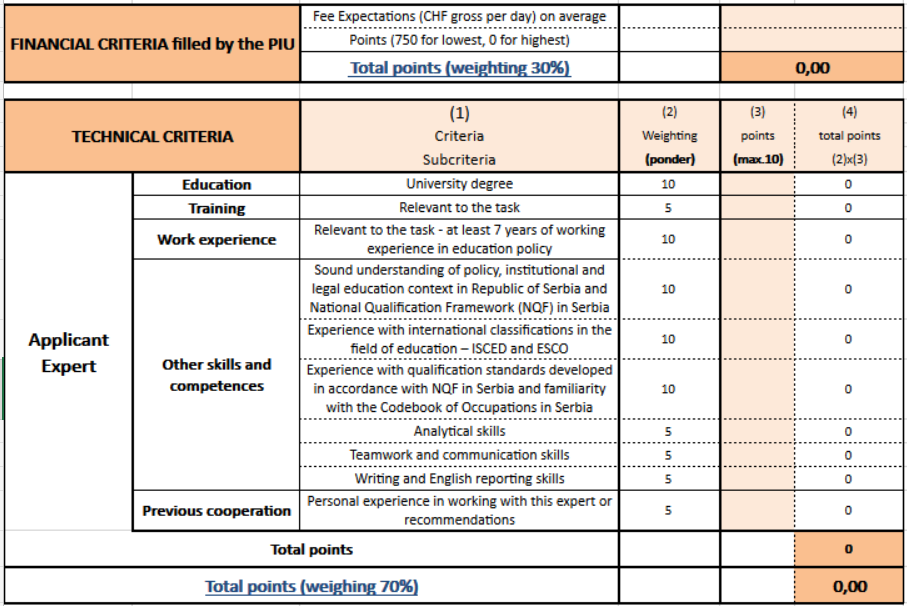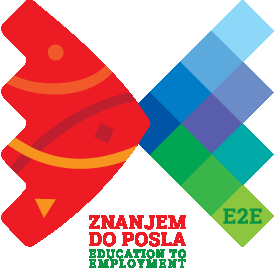Call for Experts: Education and skills development expert
14.03.2023

Support to the Ministry of Labor, Employment, Veteran and Social Affairs in testing the draft methodology for occupational standards development:
Education and skills development expert in the expert group for development of occupational standards
1. Background and context
The Swiss Agency for Development Cooperation (SDC) assigned NIRAS - IP Consult to implement the project “From Education to Employment” (hereinafter: E2E) – Phase 2 starting in January 2020 till the end of 2023.
At the national level, the key line ministry in charge of the implementation of the youth employment and employability policies in Serbia relevant for implementation of the E2E is the Ministry of Labour, Employment, Veteran and Social Affairs (hereinafter: MoLEVSA) with the support of the Ministry of Education (hereinafter: MoE). Line ministries have been actively involved in the design and implementation since the E2E Project has started.
This specific Terms of Reference is related to support the MoLEVSA as an institutional focal point for the E2E in development of National Standard Classification of Occupations (hereinafter: NSCO). This activity is envisaged in the Memorandum of Understanding between the SDC and MoLEVSA signed on April 13th, 2022 stipulating a detailed list of policy activities that will be supported through E2E/Niras-IP.
The development of NSCO is a process that has been going on for the last six years intensively, with the support of the E2E and other donors such as GIZ. The first step was the adoption of the new Codebook of Occupations within Decision on a Uniform System of Codes to enter and encrypt data in the records in the field of labour[1]. As integral parts of the Decision, five new codebooks were adopted: Codebook of Occupations, Codebook of Qualification Levels, Codebook of Countries, Codebook of Municipalities in the Republic of Serbia and Codebook of Settlements in the Republic of Serbia. The new Codebook of Occupations is the result of several years of work of the experts from the field of employment, who started from the international standard presented in International Standard Classification of Occupations[2] (hereinafter: ISCO-08) and brought them in line with the needs of the labour market in the Republic of Serbia through consultations with employers and relevant institutions. The final list of occupations was prepared with the support of the E2E.
In 2019 the E2E supported the development of a proposal for relevant institutional framework for NSCO under the Law on Employment and Unemployment Insurance, including responsibilities, maintenance and improvement of NSCO with concrete articles for amending the Law on Employment. From September 2020 to the end of 2021 the E2E provided support for the maintaining and updating the webpage for interactive communication with users of Codebook of occupations (http://kodekssifara.minrzs.gov.rs/), including enabling new functionalities (the base for entering the elements of occupational standards). In 2020 and in early 2021 the E2E supported the MoLEVSA in analysing the methodologies for development of the Occupational Standards developed within the previous projects (SORS[3] 2007-2011 and IPA 2011), developing the proposal of the elements of occupational standard and in creating the new methodology which is to be used in process of developing the occupational standards. From the second half of 2020 to the end of 2022, the E2E supported the piloting draft methodology for occupational standards development in order to test the proposed methodology in practice and improve its applicability through some fine-tuning. The draft methodology was tested through development of the standards for 10 occupations, selected based on the E2E experience (locksmith, machines locksmith, welding technician, universal welder, metalworking operator on numerically controlled machines, cook, head chef, waiter, bartender, hotel receptionist). As a results, the E2E has delivered to the MoLEVSA draft occupational standards for 10 occupations, newly developed instructions for conducting field research of the occupations and recommendations for improvement of the draft methodology.
In line with the E2E Action Plan with MoLEVSA 2022/2023, the piloting draft methodology for occupational standards development will continue on up to 20 occupations that will be selected based on the analysis of CROSO[4] data and inputs from the Working group for NSCO development[5]. In line with draft methodology, for the occupational standards development the expert group should be formed, consisting of employment policy expert/expert group coordinator, education and skills development expert, field research expert and expert for the sector/field to which the occupations for which the standard is being developed belong.
2. Objective of the assignment
Objective of the assignment is to actively participate in the expert group for occupational standards development as the education and skills development expert in order to develop occupational standards for up to 20 occupations and give recommendations for further improvement of the draft methodology for occupational standards development.
The tasks of the expert shall be:
- Adjustment of the occupation questionnaire for each of selected occupations, particularly in the part of qualifications and special conditions, and in the part of required knowledge, skills, abilities and attitudes specific to the occupation, based on the initial list of jobs for the chosen occupation.
- Participation in the preparation and training of interviewers and provide support to the interviewers/field research expert during the survey.
- Preparation of proposals of occupational standards based on the conducted research and analysis of gathered data particularly in the parts of qualifications and special conditions, required knowledge, skills, abilities and attitudes specific to the occupation; participation in creating of the final report of the expert group; participation in all expert group meetings invited by the coordinator.
All tasks are performed in line with the draft methodology for occupational standards development and the instructions for conducting field research of the occupations. These two documents as well as final report on the activities of the previous expert group for testing the draft methodology and 10 developed draft occupational standards will be available for the expert at the first meeting of the expert group and familiarity with these documents is mandatory.
The expert should participate in all expert group meetings invited by the coordinator.
The mandate shall be performed in close cooperation and consultation with MoLEVSA and E2E PIU.
3. The Expert’s profile
The consultant shall have the following skills, experience and qualifications:
- University degree
- At least 7 years of working experience in education policy
- Sound understanding of policy, institutional and legal education context in Republic of Serbia and National Qualification Framework (NQF) in Serbia
- Familiarity with international classifications in the field of education – ISCED and ESCO
- Experience with qualification standards developed in accordance with NQF in Serbia
- Familiarity with the Codebook of Occupations in Serbia
- Excellent teamwork and communication skills
- Excellent analytical, writing and English reporting skills
For the realization of this task one person is needed. It is possible to apply as a single service provider or individual expert.
4. Deliverables
The deliverables of the assignment shall comprise:
- Adjusted occupation questionnaire for each of selected occupations, particularly in the part of qualifications and special conditions and in the part of required knowledge, skills, abilities and attitudes specific to the occupation – by 15th May 2023;
- Proposal of occupational standards for selected occupations – by 30th November 2023;
- Final report of the expert group on conducted activities in regard to development of occupational standards proposals with clear set of recommendations for improving draft methodology for development of occupational standards – by 15th December 2023.
All the deliverables should be agreed within the expert group.
5. Timeline, Venue, and Reporting
For the realization of tasks defined in Article 2, the assigned number of days is up to 20 working days, which are expected to be realized in the period 3rd April – 31st December, 2023. All tasks will be carried out in Belgrade. In the case of travelling outside Belgrade for the purpose of the realisation of this ToR, the expenses of the expert (travel costs, hotel) will be paid by the E2E.
The expert submits technical reports to the National NQF and WBL advisor – Mirjana Bojanić.
6. Contracting
The service contract which is to be signed by two parties shall cover the period between 3rd April and 31st December 2023.
7. Dynamics of payment
- First instalment – against timesheet and deliverables after submitted the adjusted occupation questionnaire for each of selected occupations;
- Second instalment – against timesheet and deliverables after submitted the final report on conducted activities.
Deadline for Application: 24th March 2023
Individual consultants and organizations can apply for this assignment.
Applicants are requested to submit the following:
- - CV of the Expert;
- - Cover letter with information on the experience of the expert in the implementation of similar activities and financial offer based on man-days in CHF.
Submission of Applications should be done to the email address: E2E@Niras.com and Nevena Letić NELE@Niras.com, no later than 24th March 2023.
Only shortlisted candidates will be contacted by 31st March 2023.
8. Evaluation grid

[1] Decision on a Uniform System of Codes to enter and encrypt data in the records in the field of labour (“Official Gazette of the RS”, no 56/18, 101/20 and 74/21)
[2] International Labour Organization, 2008
[3] Statistical Office of the Republic of Serbia
[4] Central Register of Compulsory Social Insurance
[5] Working group for NSCO development – established by the MoLEVSA in July 2020, consisting of representatives of MoLEVSA, MoE, Agency for qualifications, Institute for the Improvement of Education and Training/Zavod, NES, SORS, CROSO, Chamber of Commerce of Serbia, Serbian Association of Employers, two representative trade unions and Infostud /job portal.


